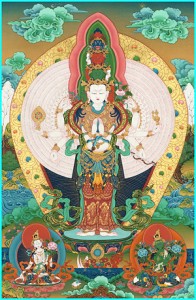The following is respectfully quoted from “The Tibetan Book of Living and Dying” by Sogyal Rinpoche:
Countless ages ago, it is said, a thousand princes vowed to become buddhas. One resolved to become the Buddha we know as Gautama Siddhartha; Avalokiteshvara, however, vowed not to attain enlightenment until all the other thousand princes had themselves become buddhas. In his infinite compassion, he vowed too to liberate all sentient beings from the sufferings of the different realms of samsara. Before the buddhas of the ten directions, he prayed, “May I help all beings, and if ever I tire in this great work, may my body be shattered into a thousand pieces.” First, it is said, he descended into the hell realms, ascending gradually through the world of hungry ghosts, up the the realm of the gods. From there he happened to look down and saw, aghast, that though he had saved innumerable beings from hell, countless more were pouring in. This plunged him into the profoundest grief; for a moment he almost lost faith in that noble vow he had taken, and his body exploded into a thousand pieces. In his desperation, he called out to all the buddhas for help, who came to his aid from all directions of the universe, as one text said, like a soft blizzard of snowflakes. With their great power the buddhas made him whole again, and from then on Avalokiteshvara had eleven heads, and a thousand arms, and on each palm of each hand was an eye, signifying that union of wisdom and skillful means that is the mark of compassion. In this form he was even more resplendent and empowered than before to help all beings, and his compassion grew even more intense as again and again he repeated this vow before the buddhas: “May I not attain final buddhahood before all sentient beings attain enlightenment.”












Yes.